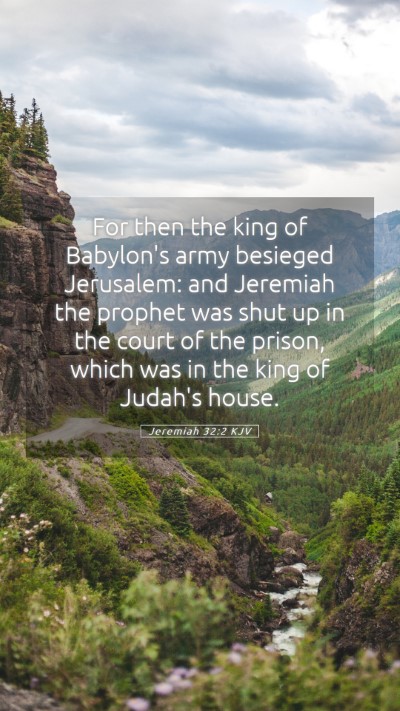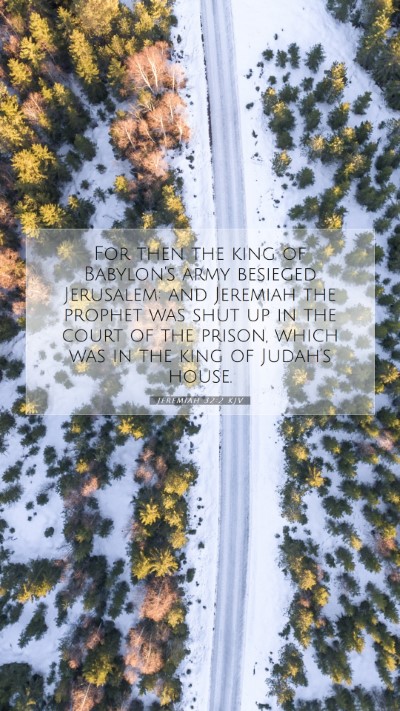Bible Verse Commentary on Jeremiah 32:2
Jeremiah 32:2 states, "For then the king of Babylon's army besieged Jerusalem, and Jeremiah the prophet was shut up in the court of the prison, which was in the king of Judah's house." This verse occurs during a critical time in the history of Israel, illustrating the dire circumstances in which the prophet Jeremiah found himself. The commentary from recognized public domain sources such as Matthew Henry, Albert Barnes, and Adam Clarke enhances our Bible verse understanding by providing historical context, theological insight, and personal application.
Context of Jeremiah 32:2
This verse is set against the backdrop of Judah's impending doom as Jerusalem is under siege. Jeremiah, a faithful prophet, is imprisoned for his prophecies that foretell the destruction due to the people's disobedience to God. The significance of this verse lies not only in its historical setting but also in its theological implications.
Theological Insights
- Matthew Henry's Commentary: Henry emphasizes the faithfulness of God to His word amidst human despair. Despite the siege, God's promises remain intact, and Jeremiah's imprisonment serves as a testament to the prophet's unwavering commitment to deliver God's messages, even in the face of personal danger.
- Albert Barnes's Commentary: Barnes highlights the irony of Jeremiah being imprisoned while executing God's will. He suggests that this reflects the broader theme of persecution faced by God's prophets and the ultimate triumph of God's plans over human opposition.
- Adam Clarke's Commentary: Clarke provides a detailed explanation of the socio-political conflicts at that time, noting that Jeremiah's confinement signifies the opposition he faced from the leadership of Judah. Clarke also points out that Jeremiah's messages were often met with hostility, a fact that adds depth to our Bible verse interpretation.
Lessons for Today
In studying this verse, readers can draw valuable lessons for contemporary life. The situation exemplifies how faithfulness to God's calling can lead to adversity, yet it also encourages believers that God's promises hold steadfast even when circumstances seem bleak.
Practical Applications
- Trust in God's sovereignty: Just as Jeremiah remained steadfast, believers are encouraged to trust in God's plan during difficult times.
- Perseverance in adversity: Jeremiah's example serves to inspire individuals in Bible study groups to remain committed to their faith, even when faced with opposition.
- Importance of prophetic voices: Encouraging the recognition of trusted spiritual leaders who speak God's truth to power, just as Jeremiah did.
Related Bible Cross References
- Jeremiah 1:19: "And they shall fight against thee; but they shall not prevail against thee; for I am with thee, saith the LORD, to deliver thee."
- Ezekiel 3:17: "Son of man, I have made thee a watchman unto the house of Israel: therefore hear the word at my mouth, and give them warning from me."
- 2 Timothy 3:12: "Yea, and all that will live godly in Christ Jesus shall suffer persecution."
Conclusion
Jeremiah 32:2 is a profound reminder of God’s faithfulness and the calling of prophets amidst resistance. By understanding Scripture through insights from public domain commentaries, Bible study resources can provide deeper Bible verse explanations, aiding individuals and groups alike in their spiritual journey. Whether through online Bible study or personal reflection, may this verse encourage readers in their pursuit of biblical truth.


